- Alumni & Convocation
The Future. Reimagined.
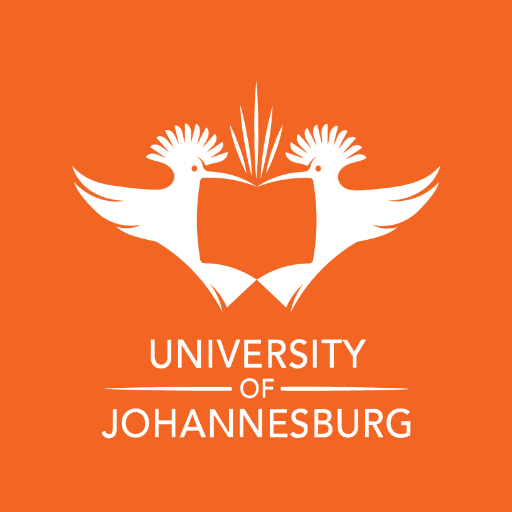
- Vision, Mission and Values
- Executive Leadership Group & Invitees
- Global Engagement
- Transformation Unit
- Registrar’s Portfolio
- Publications
- Strategic Plan
- Student Regulations
- UJ Key Statistics
- Student Portal / uLink
- Students Achievements
- Academic Calendar and Regulations
- Assessments Information
- Graduation Information
- Student Finance
- Prescribed Booklists
- Staff Web Mail
- Staff Intranet
- Academic Transcripts
- Convocation
- Dignitas Awards
- Academic Centres
- Academic Development and Support
- Research Centres
- Commercialisation and Technology Transfer
- Division of Academic Planning, Quality Promotion and Academic Staff Development
- Division for Institutional Planning, Evaluation and Monitoring
- Graphic Studio
- Institutional Office For HIV and AIDS
- Human Resources
- Language Unit
- Frequently Asked Questions (FAQs)
- More listed services…
- Online Qualification Verification
- Online Payments
- UJ Arts & Culture
- Postgraduate School
- School of Tourism and Hospitality
- Institute for Pan-African Thought and Conversation
- Institute for Intelligent Systems
- Procurement and Tenders

Doctoral Funding
About doctoral funding.
The Doctoral degree at UJ develops the intellectual, research and professional skills of the student. At UJ we provide doctoral programmes that are intense, challenging and stimulating within a heightened learning environment, thereby creating an intellectually rewarding experience. UJ Doctoral graduates are recognised experts who have made distinctive contributions in their fields.
The Postgraduate School (PGS) provides support to the University of Johannesburg’s Doctoral students. This is done through the Postgraduate Funding Management (PFM) area. PFM is responsible for communicating the various postgraduate funding options made available at UJ for Doctoral level of study.
Doctoral students are funded from internal and external funds in order for them to successfully complete their qualifications. Scholarships that are offered under internal funding are categorized as Global Excellence Stature with the research focus on the Fourth Industrial Revolution (4IR), and URC funds. URC funds have various sub-categories and are listed as UJ-Commonwealth, URC International, Supervisor-Linked (SLB) bursaries and Special URC. SLB bursaries are available for both the part-time and full-time students.
PFM has embarked on reaching our success plan by increasing number of postgraduate students. Funding for doctoral students are crucial to the university’s goals, hence external funders are assisting the university in reaching these goals. External funders are National Research Foundation (NRF), Department of Science and Innovation and the Council for Scientific and Industrial Research (DSI-CSIR), Duke CE, Organisation for Women in Science (OWSD) and various Sector of Education and Training Authority (SETA) organisations. Students can only apply when the call for these scholarships is out.
Postgraduate Funding Opportunities brochure click here
Directions & Maps
Tel: +27 11 559 4555
+27 87 2406 854
e-mail: [email protected]
- Protection Services
Quick Links
- Frequently Asked Questions
- UJ Ethics Hotline
- Support Services
- Supply Chain Management
- View Quick Links
Connect to Us
© 2024 All Rights Reserved | University of Johannesburg | T&Cs Sign In | POPIA and PAIA
Your privacy: By clicking “Accept all cookies”, you agree University of Johannesburg can store cookies on your device and disclose information in accordance with our Cookie Policy. https://www.uj.ac.za/terms-and-conditions/#cp
Privacy overview.
Why PhDs are good – for individuals, and for a country
Vice President of the Academy of Science of South Africa and DST-NRF SARChI chair in Fungal Genomics, Professor in Genetics, University of Pretoria, University of Pretoria
Disclosure statement
Brenda Wingfield receives funding from the Department of Science and Innovation in South Africa as she holds a DST/NRF research chair. She is a Professor at a South African University and is the vice president of the Academy of Science of South Africa (ASSAf).
University of Pretoria provides funding as a partner of The Conversation AFRICA.
View all partners

What is the value of a PhD? Is there a need in a developing world country to undertake a PhD study? It’s expensive (around R1 million per graduate) and in many regards a luxury for students from poor families. Even for those who have better access to money there’s a very real cost in tuition, costs of the research as well as years lost with regards to climbing the career ladder. As students in the southern hemisphere consider their study options for next year, it’s worth revisiting the pros and cons of doing a PhD.
From an individual perspective, there are good and bad reasons to do a PhD.
The good reasons include achieving a significant goal in terms of a research output, publications and in many cases solving an important problem. Doing research towards a PhD allows one to be curious, literally every day.
It’s also the first step in becoming part of the global network of researchers. Becoming part of a global community can be very gratifying.
The bad reasons would include the assumption that having a PhD will earn you a larger salary. This is not always the case. Another is peer pressure which can lead students to register for a PhD. Sometimes the pressure comes from family. Another not so good reason is when people decide to do a PhD because they don’t like the job that they are doing.
Undertaking a PhD study should only be considered if you are really passionate about research and understand that it really takes a huge amount of time and energy. It is after all the ultimate degree – there are none higher.
The value of a PhD
The bottom line is that there is no magic about the qualification. It doesn’t make you a better or smarter person.
However, people who have PhDs have shown a certain capacity and tenacity and have the degree to prove it. Many other people might have the equivalent capacity and tenacity but without the degree it is less easy for employers to identify them.
The South African government has identified that producing people with a PhD degree is an important goal. The Department of Science and Innovation has suggested that universities need to increase their output of PhD graduates to 100 graduates per million people. At the moment South Africa has 46 doctoral graduates per million people, this is one tenth of the figure for Switzerland (465) and United Kingdom (409).
The new target would take the expected output to more than 5800 PhD graduates every year. In 2016 the number of PhD graduates in South Africa was just under 3000 .
The government’s argument is that the PhD degree can be seen as a driver of the academic pipeline. If we focus on getting more PhDs, universities will also increase other graduates in the pipeline. While I support the idea of PhDs being a driver, I think that the current targets cannot be achieved for many years.
One cannot easily change the PhD pipeline quite so rapidly. In 2001 there were 802 PhD graduates, in 2009 this had increased to 1380 and in 2017 this had increased to 3057 , which has been a remarkable achievement. This is especially the case given the current global and local economic climate.
All countries need strong comprehensive universities – institutions that do more than just train students to the bachelor degree level. To have a substantive research output a university must have academics with PhDs. Only people with PhDs can train PhD graduates.
That does indeed mean building a vibrant PhD graduate training programme to support strong research output. South Africa is short of people with the appropriate qualifications (PhDs) to do the training. And it cannot expect to import such graduates to support its economy, because without strong comprehensive universities a country cannot train the range of graduates with skills necessary for sustained economic growth and development.
Quite a bit has been written about an over supply of PhD graduates. But this isn’t a problem in a country like South Africa where I have trained 52 PhD graduates, all of whom have found jobs. Not all are in academic positions, not all are still doing research. None of them have ever suggested that doing a PhD was a waste of time.
We need to train more, not less.
- Higher education
- Economic development
- South Africa
- Academic life

Associate Professor, Occupational Therapy

GRAINS RESEARCH AND DEVELOPMENT CORPORATION CHAIRPERSON

Technical Skills Laboratory Officer

Faculty of Law - Academic Appointment Opportunities

Audience Development Coordinator (fixed-term maternity cover)

- Course Program
- Destination
- Universities
- Scholarships
- Study Abroad
- South Africa
PhD in South Africa
No colleges record, why study phd (doctor of philosophy) in south africa.
1. Quality Research Environment: South African universities have a strong reputation for research excellence across various disciplines. Pursuing a PhD allows you to contribute to cutting-edge research and advancements in your field.
2. World-Class Institutions: South Africa is home to several world-class universities that offer high-quality PhD programs and have globally recognized faculty members.
3. Diverse Disciplines: South African universities offer PhD programs across a wide range of disciplines, from natural sciences and engineering to social sciences, humanities, and arts. You can choose a program that aligns with your research interests and career goals.
4. Research Opportunities: A PhD program is an opportunity to immerse yourself in in-depth research and make a meaningful contribution to your field. You'll work closely with experts, mentors, and peers to develop expertise in your area of study.
5. Global Perspective: South Africa's diverse culture and history provide a unique environment for research that can contribute to a global understanding of various issues.
6. Networking and Collaboration: Studying in South Africa allows you to connect with fellow researchers, academics, and professionals in your field, fostering collaboration and networking opportunities.
7. Cultural Experience: South Africa's rich cultural heritage and landscapes offer a unique cultural experience that can enrich your personal and academic life.
8. Affordability: Compared to many Western countries, the cost of pursuing a PhD in South Africa can be relatively affordable, making it an attractive option for international students.
9. Supportive Supervision: PhD candidates often receive guidance from experienced supervisors who help shape their research projects and academic development.
10. Postgraduate Funding: There are various scholarships, grants, and research funding opportunities available for PhD students, both from universities and external organizations.
11. Contribution to Society: Through your research, you have the potential to address pressing societal issues and contribute to the development and progress of South Africa and the world.
12. Career Opportunities: A PhD can open doors to academic positions, research roles in industry, leadership positions, and consulting opportunities, both nationally and internationally.
13. Personal Growth: Pursuing a PhD is a journey of personal growth, resilience, and intellectual curiosity. It challenges you to think critically and analytically and equips you with valuable skills.
PhD (Doctor of Philosophy) Specializations in South Africa
Admission intake for phd (doctor of philosophy) in south africa.
1. First Semester Intake (January/February): This is the primary intake for most universities in South Africa. The first semester intake typically begins in January or February, and application deadlines for this intake usually fall between August and October of the previous year.
2. Second Semester Intake (July/August): Some universities also offer a second semester intake that starts in July or August. The application deadlines for this intake are often between February and April.

Top 10 Universities in South Africa for PhD (Doctor of Philosophy)
Tuition fees for phd (doctor of philosophy) in south africa.
1. South African Residents: South African citizens and permanent residents typically pay lower tuition fees compared to international students. The exact fees can vary between universities and programs, but they might range from approximately ZAR 30,000 to ZAR 150,000 or more per year for South African residents.
2. International Students: International students usually pay higher tuition fees than South African residents. Tuition fees for PhD programs can vary significantly, ranging from approximately ZAR 60,000 to ZAR 200,000 or more per year for international students, depending on the university and program.
Cost of Studying PhD (Doctor of Philosophy) in South Africa
Eligibility for doing phd (doctor of philosophy) in south africa.
1. Master's Degree or Equivalent: Typically, applicants need to have completed a relevant master's degree (or its equivalent) from a recognized institution. The specific degree required might vary depending on the field of study and the program you're applying to.
2. Good Academic Standing: Applicants should have a strong academic record, as PhD programs are highly competitive. The specific minimum GPA or grades required can vary between institutions and programs.
3. Research Proposal: PhD applicants are usually required to submit a research proposal outlining their intended research topic, objectives, methodology, and contribution to the field.
4. Research Experience (Preferred): Having prior research experience, such as publishing research papers or working on research projects, can strengthen your application.
5. English Language Proficiency: If English is not your first language, you might need to provide proof of English language proficiency through standardized tests like IELTS or TOEFL.
6. Letters of Recommendation: Typically, PhD programs require applicants to submit letters of recommendation from professors, employers, or supervisors who can attest to your academic abilities, research potential, and suitability for the program.
7. Statement of Purpose: A detailed statement of purpose explaining your motivations for pursuing a PhD, your research interests, and how the program aligns with your academic and career goals.
8. Entrance Exams (Possibly): Depending on the program and field of study, some PhD programs might require applicants to take entrance exams relevant to the discipline.
9. Interview (Possibly): Some programs might conduct interviews to assess your suitability for the PhD program and your research potential.
10. Work Experience (if applicable): Some PhD programs might require or recommend relevant work experience, especially for professional or industry-focused programs.
11. Supervisor Availability: Some programs might require you to identify a potential supervisor who is available and willing to guide your research.
Documents Required for PhD (Doctor of Philosophy) in South Africa
1. Completed Application Form: The application form provided by the university or institution. Make sure to fill it out accurately and completely.
2. Master's Degree Transcripts: Official transcripts from your completed master's degree program, demonstrating your academic performance and courses taken.
3. Master's Degree Certificate: A copy of your master's degree certificate or its equivalent from a recognized institution.
4. Curriculum Vitae (CV) or Resume: A detailed CV or resume highlighting your academic background, research experience, work history, achievements, skills, and relevant activities.
5. Letters of Recommendation: Typically, two or more letters of recommendation from professors, employers, or supervisors who can speak to your academic abilities, research potential, and suitability for the PhD program.
6. Research Proposal: A detailed research proposal outlining your intended research topic, research questions, objectives, methodology, and potential contributions to the field.
7. Statement of Purpose: A document explaining your motivations for pursuing a PhD, your research interests, and how the program aligns with your academic and career goals.
8. English Language Proficiency Scores: If English is not your first language, you might need to provide scores from standardized English language proficiency tests like IELTS or TOEFL.
9. Entrance Exam Scores (if applicable): If the PhD program requires entrance exams, you'll need to provide scores from the specific tests they require.
10. Portfolio (if applicable): For creative or research-focused programs, you might need to submit a portfolio showcasing your previous work or research projects.
11. Interview (if applicable): Some programs might require an interview as part of the application process to assess your suitability for the program.
12. Supervisor Agreement (if applicable): Some PhD programs might require you to secure a potential supervisor who agrees to guide your research.
Scholarships for PhD (Doctor of Philosophy) in South Africa
1. University Scholarships: Many universities in South Africa offer scholarships, bursaries, or grants to exceptional PhD candidates. These scholarships might be based on academic merit, research potential, or specific fields of study.
2. Government Funding: Government departments or agencies in South Africa might provide scholarships or grants to support research and higher education. The National Research Foundation (NRF) is one such organization that offers funding for research-based studies.
3. International Scholarships: Some international organizations, foreign governments, and foundations offer scholarships for international students pursuing PhD studies in South Africa.
4. Research Grants: Depending on your field of study, you might be eligible to apply for research grants from institutions or organizations that fund research projects aligned with your research topic.
5. Industry Partnerships: Some industries and companies might offer funding or sponsorship to PhD candidates who are conducting research relevant to their sector.
6. University Research Positions: Universities often have research positions available for PhD students, where you can work on research projects while receiving a stipend.
7. Departmental Scholarships: Some academic departments within universities might have their own scholarship funds to support outstanding PhD candidates.
8. Fulbright Program: The Fulbright Program offers scholarships for South African students to pursue PhD studies in the United States.
9. Exchange Programs: Some universities participate in exchange programs that provide funding opportunities for PhD students to study abroad or collaborate with international institutions.
10. Private Foundations: Explore scholarships offered by private foundations and charitable organizations that support higher education and research.
11. Employer Sponsorship: If you're employed, check if your current employer offers sponsorship or support for further education.
12. Online Scholarship Databases: Websites like EduConnect, Scholarship-Positions, and StudyTrust provide information about various scholarships and funding opportunities in South Africa.
Jobs and Salary after PhD (Doctor of Philosophy) in South Africa
1. University Lecturer/Professor: Teaching and conducting research at universities and colleges. Salaries can vary widely based on the university, academic rank, and field of study. Salaries can range from ZAR 300,000 to ZAR 1,000,000 or more per year.
2. Research Scientist: Conducting advanced research in academia, government agencies, research institutions, or industry. Salaries can range from ZAR 350,000 to ZAR 800,000 or more per year.
3. Postdoctoral Research Fellow: Engaging in postdoctoral research projects to further develop expertise. Salaries can range from ZAR 250,000 to ZAR 600,000 or more per year.
4. Data Scientist/Analyst: Analyzing and interpreting complex data sets to extract insights and inform decision-making. Salaries can range from ZAR 400,000 to ZAR 900,000 or more per year.
5. Consultant: Providing specialized expertise and solutions to organizations in various industries. Salaries can vary widely based on the consulting field and level of experience.
6. R&D Manager: Overseeing research and development projects in industries such as pharmaceuticals, technology, and manufacturing. Salaries can range from ZAR 600,000 to ZAR 1,500,000 or more per year.
7. Government Researcher/Analyst: Working for government agencies to analyze data, develop policies, and contribute to public initiatives. Salaries can range from ZAR 350,000 to ZAR 800,000 or more per year.
8. Entrepreneur/Startup Founder: Using research expertise to launch your own business or startup in fields such as technology, healthcare, or innovation.
9. Industry Specialist: Working in industries such as finance, healthcare, energy, or engineering as a subject matter expert or consultant. Salaries can vary based on the industry and specialization.
10. Environmental Scientist: Conducting research and analysis related to environmental issues, conservation, and sustainability. Salaries can range from ZAR 300,000 to ZAR 700,000 or more per year.
11. Healthcare Researcher: Contributing to medical and healthcare research in areas such as clinical trials, epidemiology, and public health. Salaries can vary based on the specific role and industry.
12. Policy Analyst/Researcher: Working with government agencies, NGOs, and think tanks to analyze policies and contribute to informed decision-making. Salaries can range from ZAR 350,000 to ZAR 800,000 or more per year.
- WhatsApp --> WhatsApp
Book your Profile Evaluation to Study Abroad in Public Universities
Get a Guaranteed Scholarship of Minimum 20% to Study Abroad
© 2024 Standyou Data Info Labs Private Limited.
Please Enable Javascript to View This Page.
Want to skip Verification for now ? Click here

Doctor of Philosophy in Theology
Our Doctor of Philosophy in Theology is designed to raise up scholar-leaders in various fields of Christian ministry. It is a fully-accredited online programme that provides the opportunity for ground-breaking theological research.
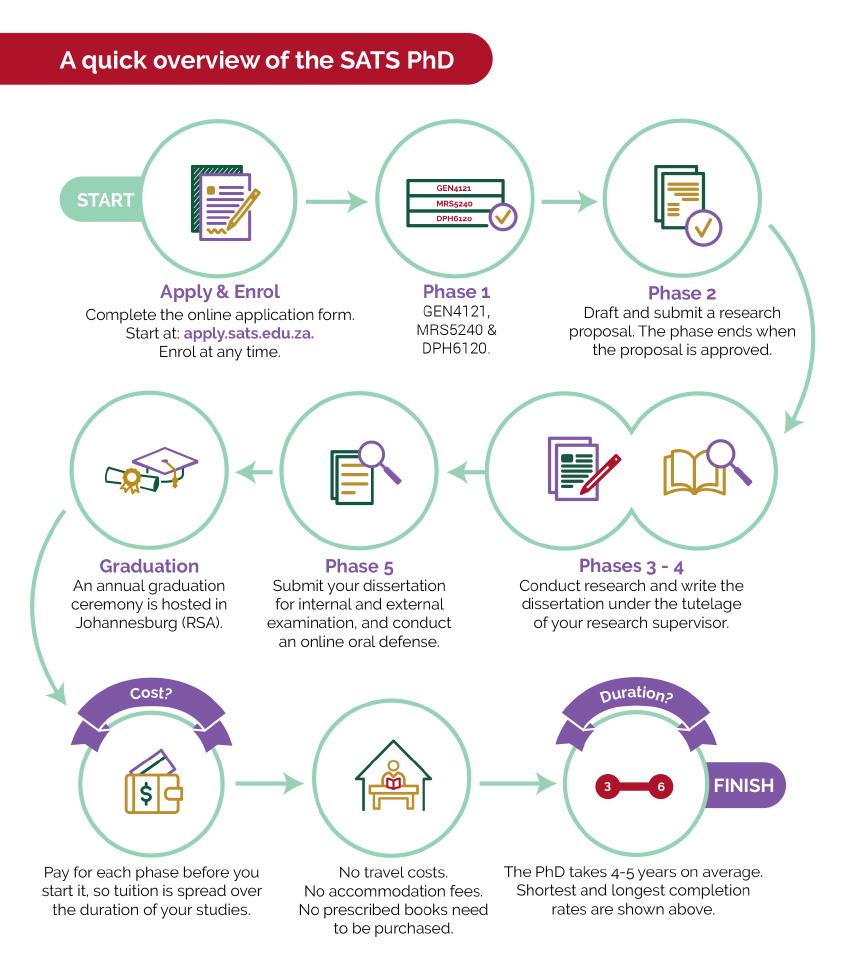
Do I Qualify?
To be admitted to the Doctor of Philosophy in Theology, a candidate must have achieved an above-average grade in their Master’s degree. Additionally, a candidate must meet one of these admission requirements:
- An accredited Master’s degree in a theological field, with a substantial research project.
- An accredited Master’s degree in another field, with a substantial research project, accompanied by an accredited Bachelor Honours in Theology.
Submit your application to determine if you qualify to study with us.
The PhD is a research degree that culminates in an original dissertation of 80,000–100,000 words. The learning journey is divided into five phases.
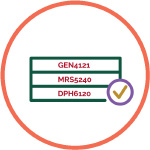
Phase 1 begins when you enrol. It consists of two online courses: GEN4121 Theological Orientation and MRS5240 Research Concept Development. Only outstanding candidates who achieve 75% or higher will be invited to proceed.

Phase 2 requires you to draft and submit a formal research proposal, which you do in consultation with your appointed supervisor, a scholar specialising in your research area. The phase ends when the SATS Research Committee approves your research proposal.

Phases 3–4 are where you conduct the research and write the dissertation, under the tutelage of your appointed supervisor.

Phase 5 is about examination! You submit your dissertation for internal and external examination, making the required improvements. You must also submit an article based on the thesis. The PhD journey culminates in the online oral defence. This takes place after the dissertation passes both the internal and external evaluation process. The student is required to defend his or her thesis by responding to questions posed by a team of experts in the chosen fields of study.
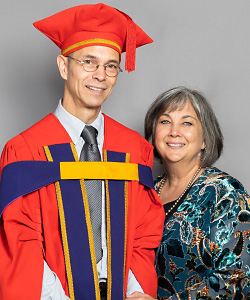
US Students
North American students find SATS’ PhD in Theology programme relevant and affordable. By 2016 there were already ten Ph.D. graduates from the USA, with a further 32 enrolled students.
Recently our MTh and PhD programmes were submitted to two of the most frequently used and highly recommended evaluators in the USA, namely, the International Education Research Foundation, Inc. (ierf.org) and the American Association of Collegiate Registrars and Admissions Officers’ International Education Services, and both confirmed that these degrees represent attainment of a level of education comparable to the equivalent degrees from a regionally accredited university in the United States. Our degrees are also recognised by the German website anabin.kmk.org which provides information about the evaluation of foreign qualifications, as well as by the Brazilian and Argentinian governments.

How Long Does It Take?
The minimum duration is two years, but the average completion is 3 – 6 years with a maximum of 7 years.
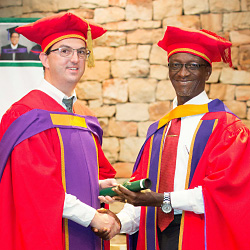
Students From Africa
Several potential PhD candidates from Africa have told us that the demands made upon them as Christian leaders prevent them, in their own country, from giving the attention that their PhD studies would require. They have pointed out that the only solution is to leave their country for a short time in order to devote their full attention to their research.

Click here to see the Full Price List for all programmes
You pay at the beginning of each phase, so the tuition is spread over 3–5 years (the average time it takes to complete the programme).
The tuition fees are the total cost of the programme. There are no hidden costs, no travel costs, no accommodation costs, and no prescribed books to purchase.
For many PhD programmes, these “hidden” costs can easily double or triple the total cost of study.
Kindly note that all fees paid to SATS are non-refundable.
Complete our online application form, or contact us.

- Governance Structure of Department
- Administrative Support
- Educational Resource
- History of professions
- Professional Bodies
- What do graduates say?
- What do SLP and Audios do? A day in the life ...
- What is a Speech-Language Pathologist?
- What is an Audiologist?
- Accommodation
- Financial assistance
- Student support
- Our Clinics
- Current projects
- Why study at UCT?
- CSD Research
- About Disability Studies
- Disability Studies Undergraduate Programme
- Disability Studies Postgraduate Programmes
- Disability Studies Staff
- Disability Studies Research
- Current Students
- TEDI: Research
- TEDI courses
- About Nursing & Midwifery
- Postgraduate
- Nursing & Midwifery Staff
- Postgraduate Diploma in Nephrology Nursing Programme
- Postgraduate Diploma in Nursing
- Postgraduate Diploma in Ophthalmic Nursing
- Master of Science (Nursing) Dissertation-only programme
- MSc(Nursing) by coursework and minor dissertation
- Professional Masters
PhD in Nursing & Midwifery
- Nursing & Midwifery Research
- Occupational Therapy as a career
- OT Undergraduate Programme
- MSc in Occupational Therapy by coursework (MM018)
- MSc in Occupational Therapy by dissertation (MM005)
- Rules & regulations
- PhD in Occupational Therapy
- Occupational Therapy Staff
- Occupational Therapy Research
- OT Qualification Verification
- About Physiotherapy
- Courses offered
- MSc in Physiotherapy
- Doctor of Philosophy in Physiotherapy
- MSc in Exercise and Sports Physiotherapy
- Physiotherapy Staff
- Physiotherapy Research
- Current News
- Archive News
- Newsletters
- IDEA Research Unit
- Research Committee
- About Inclusive Practices Africa
- Inclusive Practices
- Influencing and Communicating
- Research, Teaching and Learning
The degree provides the opportunity for a candidate to undertake independent research and advanced study under the guidance of a supervisor, building on previous knowledge gained in a particular subject area at Masters level. The thesis presented must constitute a substantial contribution to knowledge in the chosen subject and may embody only the original work of the candidate.
The programme is designed to enable students to acquire both methodological sophistication and substantive knowledge appropriate to a discipline. The PhD programme is designed to encourage the study of substantive concerns, methodological approaches, and research and communication skills necessary either for employment or for further independent research.
The proposed research should fall into the research focus areas of the Division of Nursing and Midwifery.
Selection criteria
- A recognised Masters degree in Nursing, Midwifery or a related discipline
- Registration as a professional nurse
- A suitable concept document – see here for guidelines
- Proposed research should be within the Division’s Research Focus areas
A minimum of two years full time study.
Research setting
- Research may be undertaken in South Africa or in the country of an international candidate.
- If an international candidate wishes to conduct clinical research in South Africa, they will need to be registered as a nurse and/or midwife (as appropriate) with the South African Nursing Council.
Research approval
- Research studies may not commence until the Faculty of Health Sciences Human Research Ethics Committee approval is granted, and the necessary permissions from research settings / institutions.
- In the case of international students, in addition to UCT research ethics approval, they will need to get research ethics approval from a local (in-country) higher education or research institution, as required by the country concerned.
- Executive Education
- Leadership & Management Development
- Management Skills
- Sustainability
- Industry Specific
- Academic Programmes
- MBA Full Time
- MBA Modular
- Executive MBA
- PhD in Business Administration
- PGDIP in Management Practice
- CEMS Master of International Management
- MPhil in Inclusive Innovation
- MCom in Development Finance
- PGDip in Development Finance
- Scholarships
- Assessments
- Customised Programmes
- Customisation Design Process
- Customised Programmes Solutions
- Our Corporate Clients
- Customised Study Tours
- Full-time Faculty
- Emeritus Faculty
- Adjunct Faculty
- Research Themes
- Research Ethics
- Publications
- Specialised Centres
- Allan Gray Centre for Values-Based Leadership
- Bertha Centre for Innovation & Entrepreneurship
- Development Finance Centre
- Solution Space
- GSB Library
- GSB Initiatives
- Case Writing Centre
- Power Futures Lab
- Affiliations & Projects
- Centre for Coaching
- Lean Institute Africa
- About the GSB
- Our History
- Our Credentials
- Campus and Locations
- Work for us
- School Leadership
- Management Committee
- Heads of Departments
- The Student Experience
- Career Leadership Centre
- Student Societies
- The Alumni Experience
- Alumni Events
- Alumni Reunion Weekend
- Alumni News
- International Relations
- Student Exchange
- GSB Partner Schools
- Ideas Exchange
- Emerging Market Business
- Entrepreneurship & Innovation
- Leadership & Ethics
- Learning & Development
- Management Fundamentals
- Year in Review Publication
- Newsletter Subscription
DOCTOR OF PHILOSOPHY SPECIALISING IN BUSINESS ADMINISTRATION
Make an original contribution to research, phd funding.
The GSB is committed to making funding and scholarship opportunities available to talented, motivated and deserving individuals who meet the entrance criteria for our academic programmes.
PROGRAMME FEES FOR THE 2024 PHD INTAKE
Total Programme Fees:
- Tuition Course Fee (per annum or part thereof): R25 680
PHD DEPARTMENTAL SCHOLARSHIPS
The GSB PhD programme awards PhD Departmental scholarships to first year and returning PhD students accepted onto the programme. Scholarships are granted on the basis of both academic merit and financial need, and will cover one year of tuition for three successful applicants.
Please note: Annual renewal is not guaranteed.
The John and Anahis Davidian Innovation and Industry Emergence and Evolution Ph.D. Scholarship is available to returning students (2nd year onwards) accepted onto the programme. Applicants may study innovation processes in diverse forms, different research contexts, and at different levels of analysis. Special consideration will be given to proposals focused on industries or company populations as level of analysis.
POSTGRADUATE DEGREE FUNDING
You may apply for various UCT funding opportunities and fellowships for doctoral degrees.
Click here for more information.
ADDITIONAL FUNDING OPPORTUNITIES
- South African citizens can approach EduLoan for a study loan
- Citizens of other countries should approach banks or loan institutions in their own countries as a first point of call. Alternatively, please see the "Useful international and local scholarship websites" section on the UCT website.
- Prodigy Finance offers loans to international students to study at the world's top business schools, including the UCT Graduate School of Business. Click here for more information.
- Feenix crowd funding, powered by Standard Bank, is a platform for donors to sponsor tuition fees. Read more
Start your application journey here
We’d like to know more about you. Please fill out the form below, to enquire about doing the PhD or to begin the pre-application process.

IMAGES
VIDEO
COMMENTS
PhD opportunities in South Africa require you to submit a written thesis at the end of your PhD. This is normally between 80,000-100,000 words. This is normally between 80,000-100,000 words. It is normal in South Africa for PhD candidates to give a written notice to their faculty at least two or three months before submitting their thesis for ...
Our campus is situated in the picturesque Tygerberg area of Cape Town, South Africa, and incorporates a ground-breaking new Biomedical Research Institute (BMRI). The faculty ranks among the top 175 medical and health schools in the world (Times Higher Education rankings 2024) - up from the top 200 in 2022).
2. Tuition fees are low. You can pay anywhere between 35 to 19,000 EUR per year for a study programme in South Africa. There are many factors that influence these costs: type of university (public vs private) study level (Bachelor's, Master's, PhD) discipline (Engineering, Medicine, Humanities, etc.)
1,061 EUR / year. 2 years. This Accounting - Accounting and Finance program is offered by the Department of Accountancy within the College of Business and Economics at the University of Johannesburg. Ph.D. / Full-time / On Campus. University of Johannesburg Johannesburg, South Africa. Ranked top 2%. Add to compare.
The Next Generation Social Sciences in Africa call is open to citizens of any sub-Saharan African country doing PhD at an accredited university in South Africa, Tanzania, Ghana, Kenya, and Uganda. These scholarships support studies focused on three thematic areas: Peace, Security, and Development.
The Postgraduate School (PGS) provides support to the University of Johannesburg's Doctoral students. This is done through the Postgraduate Funding Management (PFM) area. PFM is responsible for communicating the various postgraduate funding options made available at UJ for Doctoral level of study. Doctoral students are funded from internal ...
PhD students at the UCT GSB are a vital part of our research community and research strategy. The University of Cape Town is Africa's leading research institution and the PhD programme at the GSB is an essential component of this. PhD candidates are expected to: Develop a formal research proposal within the first six months of registration.
Embarking on the path to a PhD is a scary business. Shutterstock. A Doctor of Philosophy, which most people know as a PhD, is the highest academic accolade. It demands a substantial investment of ...
Deposit payable on acceptance of admission (Included in tuition fees) R31 826.00. R31 826.00. Generate Quote. PhD Business Management and Administration. R63 651.00. R63 651.00. R127 302.00. Stellenbosch Business School reserves the right to change the fees at any time.
Doctoral-level research to support the growth agendas of South Africa and Africa - this is the focus of Stellenbosch Business School's PhD Development Finance. During the first year of this programme, you need to attend 2 blocks of 2 weeks each on the Business School's campus. During this time, you will acquire advanced research ...
The Doctoral Programme is a large, dynamic and wide-ranging programme in the School of Education. This programme aims to graduate independent researchers in the fields of Social Justice Education, Teacher Development Studies, Curriculum, Education Leadership, Management and Policy, Educational Psychology, Gender Studies, Adult Education and Higher Education across all learning areas and uses a ...
The Department of Sociology conducts postgraduate interviews in the last week of October, November and January. If you want to check that your application has been received by the Student Services Centre, please contact: +27 (0)12 420 4111 or [email protected]. If you want to track the progress of your application in the Sociology department, please ...
PhD applicants need to: Hold a recognised Master's degree (or in special circumstances, at the discretion of the Senate, an approved Bachelor's degree or qualification recognised by the Senate as equivalent).Verification of whether the qualification is equivalent to a South African degree is also required. This can be done by contacting the South African Qualifications Authority.
In 2016 the number of PhD graduates in South Africa was just under 3000. The government's argument is that the PhD degree can be seen as a driver of the academic pipeline. If we focus on getting ...
Jobs and Salary after PhD (Doctor of Philosophy) in South Africa. 1. University Lecturer/Professor: Teaching and conducting research at universities and colleges. Salaries can vary widely based on the university, academic rank, and field of study. Salaries can range from ZAR 300,000 to ZAR 1,000,000 or more per year.
Education. 207 EUR / year. 2 years. The Doctoral Programme is a large, dynamic and wide-ranging programme in the School of Education from University of Kwazulu Natal. Ph.D. / Full-time, Part-time / On Campus. University of Kwazulu Natal Durban, South Africa. Ranked top 3%. Add to compare.
North American students find SATS' PhD in Theology programme relevant and affordable. By 2016 there were already ten Ph.D. graduates from the USA, with a further 32 enrolled students. Recently our MTh and PhD programmes were submitted to two of the most frequently used and highly recommended evaluators in the USA, namely, the International ...
The PhD programme is designed to encourage the study of substantive concerns, methodological approaches, and research and communication skills necessary either for employment or for further independent research. The proposed research should fall into the research focus areas of the Division of Nursing and Midwifery. Selection criteria.
What We Do: SAAPhDs is a non-profit, largely volunteer run, national association of academic / non-academic doctors, researchers and other technical professionals which is about knowledge sharing and advancing the research output from varies fields of study in South Africa. Membership recruitment, retention and growth is placed in the broad ...
The GSB is committed to making funding and scholarship opportunities available to talented, motivated and deserving individuals who meet the entrance criteria for our academic programmes. PROGRAMME FEES FOR THE 2024 PHD INTAKE. Total Programme Fees: Tuition Course Fee (per annum or part thereof): R25 680. PHD DEPARTMENTAL SCHOLARSHIPS.
A South African study found that there was a growing gap between the number of PhD graduates and the number who find employment. A PhD is the highest academic degree awarded and this sometimes causes employers to view PhD graduates as overqualified. The science field is flooded with doctorates, making it harder for science graduates to compete.
Academic here. You won't on average get paid a stipend to do a PhD in South Africa. There are a few PhD posts with NRF funding which pay a stipend but they are rare and you usually have to be South African or come from the SADC region. There is DAAD which may fund your PhD though, which will pay a stipend. As will the Mandela Rhodes scholarship.
In 2021, a newspaper article indicated that "South Africa needs to scale up the production of PhD graduates". In fact, the need to produce PhD graduates is highlighted in the National ...